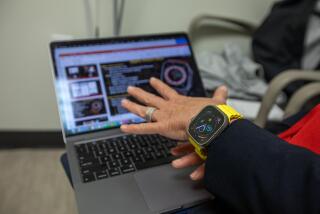Haydon, Artificial Heart Patient, Dies
LOUISVILLE, Ky. — Murray P. Haydon, a retired auto worker who lived for 488 days with a Jarvik-7 mechanical heart, died Thursday, leaving only one survivor among the five men who have received permanent artificial hearts. He was 59.
The third recipient of the mechanical heart, Haydon was declared brain dead at 10:45 a.m., said Dr. William DeVries, the surgeon who implanted all the permanent artificial hearts used in the United States.
Haydon’s failing kidneys caused his nervous system to deteriorate over the past 10 days, DeVries said at a news conference at Humana Hospital Audubon, where Haydon had lived since he received his artificial heart on Feb. 17, 1985.
Haydon’s doctors and his family agreed not to place him on dialysis to help his kidney function, DeVries said. The family did not believe that it would improve his quality of life.
“Haydon’s deterioration and death was similar to what happened to Barney Clark,” the first recipient of the Jarvik-7 artificial heart, who died 112 days after the Dec. 2, 1982, implant at Utah Medical Center, DeVries said.
“We are sad now that he is no longer with us,” Haydon’s family said in a statement read by DeVries. “We are also grateful that he lived 16 months longer than he would have without the artificial heart.”
Haydon’s attitude remained good in his last days “and he continued to enjoy life,” DeVries had said in an earlier statement.
“We came to know him not just as a patient but also as a good friend,” he said.
Haydon, who would have celebrated his 60th birthday June 28, was the third person to receive a Jarvik-7 heart and the second longest-living recipient. He had spent most of his time in the hospital’s intensive-care unit and required a respirator to help him breathe much of the time.
‘Looked Better’
William Schroeder’s artificial heart was implanted Nov. 25, 1984, and he is still a patient at Humana Audubon. DeVries said Schroeder “looked better today than he’s looked in four months.” He was told of Haydon’s death and “it did sadden him,” the doctor said.
“One of his friends had not made it,” DeVries said.
Leif Stenberg, 53, of Sweden received an artificial heart on April 7, 1985, and died Nov. 21. Jack Burcham became the fifth recipient on April 14, 1985; he died 10 days later at Humana Audubon.
“The contributions of these individuals, like Haydon, have been enormously beneficial in leading up to a better mechanical device and improved patient treatment post-operatively,” DeVries said. “There’s no doubt in my mind their participation in this research will help save thousands of lives in the future.”
Left Hospital
Haydon left the hospital only three times, visiting neighbors in January, taking a van ride the next month and stopping briefly at his suburban Louisville home in March.
DeVries’ implant program has come to a standstill because of fewer patient referrals, stricter federal regulations and virtual abolishment of age limits for patients to qualify for heart transplants. On Jan. 8, the U.S. Food and Drug Administration adopted new restrictions on the Jarvik-7, including case-by-case approval of further implants, new procedures for treating patients and periodic reports to the government on patient status.
Haydon, a retired auto assembly-line worker known to friends as “M. P.,” had battled cardiomyopathy, a progressive deterioration and swelling of the heart, since 1981. In January, 1985, his children asked family physician Jerome Lacy about the possibility of an artificial heart.
‘Wasting Away’
“They had seen Haydon wasting away and becoming exhausted from such simple tasks as brushing his teeth,” Lacy said.
Haydon made satisfactory progress until blood began accumulating in his chest. On March 2, 1985, surgeons closed a tiny opening inside Haydon’s chest and returned him to a respirator.
Haydon spent seven years in the Army and Air Force. He operated a barber shop with an uncle, then worked at Ford Motor Co.’s Kentucky truck plant for 14 years before retiring in June, 1983, for health reasons.
He was described by friends and relatives as a quiet man, always willing to lend a helping hand. He had a passion for history and geography and enjoyed working puzzles.
Such has been the medical progress in a year that “if Haydon came to us today, we wouldn’t do him,” DeVries said. He said Haydon had been turned down by three natural-heart transplant programs because he was too old, but now men his age are routinely accepted for natural heart transplants.
In addition to his wife, Haydon is survived by a son, two daughters and five grandsons.






